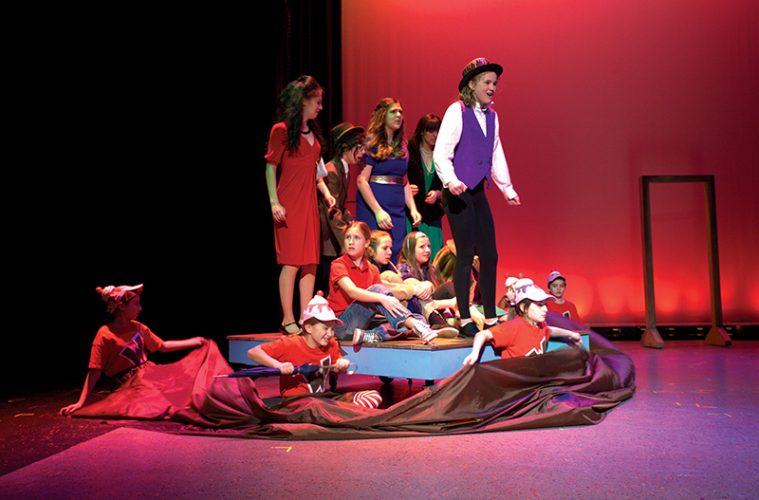“Say yes and try new things.”
“Be brave.”
“Respect other actors’ choices and opinions.”
“Be on time.”
These are some of the phrases written on a piece of poster board that hangs in the young company’s rehearsal space at the Stoneham Theatre. These directives are part of the young actors’ company agreement, things they pledge to do through the course of working on a theatrical production. They’re things that, if adhered to, will certainly make any theatre performance a better one. But they’re also things from which anyone can learn.
“We really believe at the end of the day that good theatre makes good people,” says Dori Robinson, Stoneham Theatre’s education director. “One of the wonderful things about Stoneham Theatre is its true dedication to education. It really walks and talks its commitment to education and the education process.”
Since its founding in 2000, the Stoneham Theatre has been a professional nonprofit theatre that produces six Mainstage shows a season (like the upcoming How to Succeed in Business Without Really Trying) and also hosts many other performances. But it’s also been home to the young company, which provides a wide variety of year-round educational theatre programs for students in grades 1 through 12.
“We have lots of different ways that kids can get involved in the theatre,” says associate artistic director Caitlin Lowans.
There are four programs that are based on age, and activities include a Shakespeare festival, voice and dance lessons, and an ever-changing lineup of classes, which this spring includes stage combat, a study of what makes a great villain, and acting through objects, like puppets and masks. Students also stage productions throughout the year. This year’s winter festival, for instance, featured shows like Carrie: The Musical, which is based on the Stephen King horror novel, and Just So, based on Rudyard Kipling stories.
“One of the things about our programs that is exciting is that we’re also doing slightly unexpected and often challenging work,” Lowans says. “We’re doing new and different stories and work that our audiences may not necessarily be familiar with, and [we’re] trusting these young people to do it well.”
Trusting young people—to rise to the occasion, to challenge themselves, to learn the responsibilities that come with staging a theatrical production—is a major theme in any discussion of the young company. By being a part of the company, students learn skills like singing, dancing, acting, and blocking a scene, but according to Lowans and Robinson, there’s so much more that students take away beyond the technical skills of theatre. They also learn the life skills that cre- ate good citizens.
For instance, “theatre builds empathy because you are constantly stepping into someone else’s shoes,” says Robinson. Actors must not only learn a character’s lines but also go on an emotional journey with that character, see life from their perspective, and advocate for them, Lowans adds.
There’s more, too. Being on time for rehearsals shows a sense of responsibility toward fellow company members. So do learning your lines and being a prepared and trustworthy scene partner.
“There are such immediate consequences in theatre,” Lowans says. “If you haven’t sufficiently worked on your lines and can’t remember them with your scene partner in front of a group of people, there’s a very vis- ceral reminder” of the importance of personal responsibility and being prepared.
Theatre also encourages taking chances, being daring, making bold choices, thinking on your feet, and trying new things.
“That makes theatre a very safe space, and that makes the program a safe space,” Robinson says. “Everyone can find a place to be fully themselves.” stonehamtheatre.org/youngcompany

